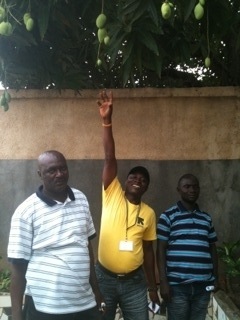Mango Time
Mangos and tendrils
It’s mango season and the trees in Liberia are laden down with succulent fruit. The green oval mangos sag tree branches as if trying to come gently to ground. The children on their way to school in disregard, jump towards, fire objects at, or whisk poles towards these fructose filled jewels in hopes of a free snack.
I ask our drivers who sit under the mango tree in the front corner of the compound against the gray concrete wall if they are enjoying the roof of the new drivers’ quarters. Kamo, Tony and Moussa understand the joke and laugh easily. None of the construction at the new office is happening as planned. The dish for the internet in the back rests like a concrete bull dozer on an awesome pedestal and is surely aimed perfectly at a space between two satellites. There has been no water in the bathroom since the beginning, which of course does not stop certain miscreants from using it.
“At least you have mangos.” I say.
Kamo, Tony and Moussa look up and resolved say, “But, they are not ready, O.” The mangoes hard, like smooth grenades, are suspended from thick tendrils above them. Daring them, but looking defiant and adherent too.
Roof of drivers' quarters
“Come on. No-one ever waits for mangos to get ripe in Liberia,” I challenge, “The large tree in the old office doesn’t have a single mango on it since we left and there is no one to keep guard.”
“We wait for them to get ripe,” Moussa says.
“Yes, we wait for them to get ripe,” Tony says.
“Then what’s in your pockets!” I exclaim. And at this the drivers chuckling pull out green mangoes from the clothing on their bodies, one after the other, as if they are West African magicians in a David Copperfield show, as if they in a race to see who can hold nature’s most.
The drivers’ mango stealing is perfectly permissible, of course, because this is not stealing. At this time of year, the rules of harvest have changed. On the tree, mangos are public property, like air, like a vista, like the sea. People traipse easily into each other’s yards and often around unperturbed masticating goats and start the process of lobbing, pulling, climbing, and hopping unquestioned. As long as the mangos come falling from the tree, they are fair game. On the ground, mangos last as long as money—not long at all— so generally, mango on the ground is not an apt descriptor. At most, mango on the ground means that there exists three to four mangos organized in neat groups resting on a vendor’s wood table waiting for a stupid expatriate like me to buy them. Upon completion of the transaction, two competing sentiments are floated. One, the expatriate thinks, wow. What a good deal. Mangos for only fifty cents. In the states these go for a buck. Two, the Liberian thinks, not so smart these white folk. Don’t they know that mangos are free? Must be nice to be rich.
Mangos "on the ground"
It is later in Grand Gedeh, while visiting refugee camps, when I set on a journey to avoid mango withdrawal. With red dust in my nostrils, my hair looking like an Asian with a bad blond hair dye job, I roll into Zwedru town parched and looking for one-stop sugar and hydration. There aren’t any mangos on the street because it is later in the day. I approach a cell-phone vendor and his posse and describe not unlike a drug addict explaining symptoms to an unsympathetic crowd my predicament. The cell phone man listens patiently, then whispers to colleagues over his right shoulder then his left. Awkward, I rock back and forth across my feet over a broad based stance. The cell phone man looks, protrudes his lips, squints, then gestures for me to follow. Soon, we are headed down an embankment, between two buildings, over a trickling stream, past goats, to a small collection of row houses with women cooking and chopping and children playing around them.
We are greeted by the conclave patriarch. “The man wants mangos,” the cell phone guy says
“We got mangos,” the patriarch says
“How much,” I say
“Twenty Liberian,” the patriarch says
“Sounds, good,” I say, “I’ll take fifteen.”
By any means necessary
At this, the two men proceed to lift up two poles that have been placed against the side of a white tin roofed building. With a rudimentary hook like apparatus attached to each end, they begin flicking mangos off the tree with a thud, a bounce and a roll. It takes some time for them to get control of the poles but one by one the mangos begin to fall. The feeling soon is not unlike that of a county fair. I am cheering, the men are competing, and the neighborhood children have come yelling with delight as the mangos fall from the tree to the roof to the floor ricocheting quickly across the dirt with the children chasing. Being children, a series of scuffles ensue until the patriarch gently reassures that if the children behave, they will receive a share of the day's mango proceeds. This brings the children to a kind of unnatural order. But they are exuberant when their efforts eventually earns them ten (Liberian) bucks a piece. They raise their money over their heads and cry out in elation towards the sky silhouetted by the eaves of the mango trees around them. This is my fix.
A fruitful day's harvest








